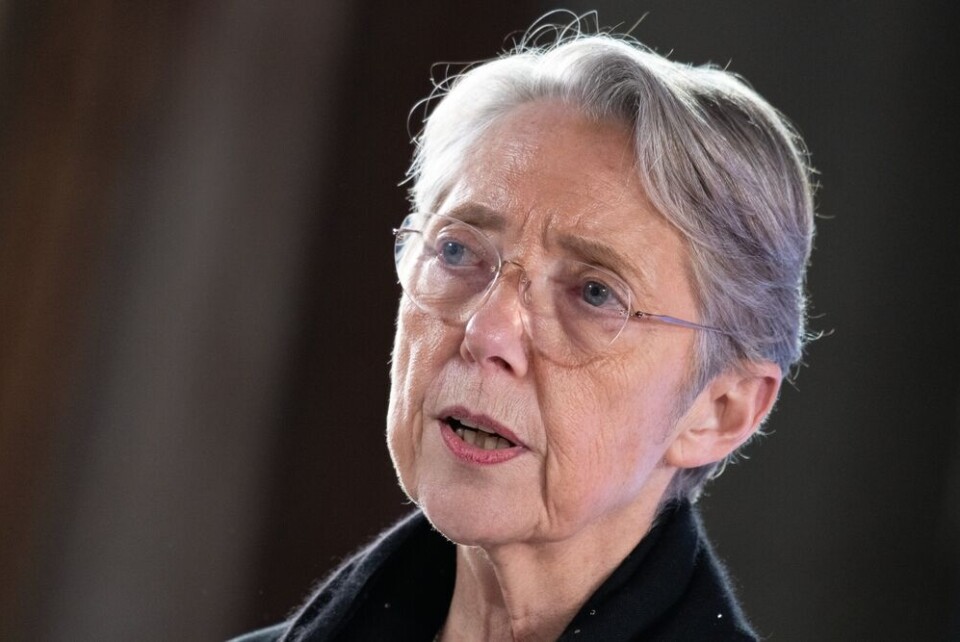-
French crisps brand gains global attention after Dua Lipa post
Singer posted photo of her shopping basket and the only food items were Brets crisps in braised chicken, honey mustard, and ‘Fromage du Jura’ flavours
-
Why supermarkets are urging shoppers to buy French leeks
Try our French classic leek vinaigrette recipe
-
New bill targets skiers under influence of alcohol or drugs
There are not currently any specific rules on skiing while under the influence
Six key points to note from French Prime Minister’s recent interview
Fuel aid, taxes, medical fees and tackling crime were among the topics covered by Elisabeth Borne

Prime Minister Elisabeth Borne has sought to reassure people living in France about changes over the coming months, including saying that the government will not raise taxes.
She spoke after the first cabinet meeting of the new political year, as parliament resumed on Wednesday, August 22 after its summer recess.
She made six key points.
Enfant tué dans une fusillade à Nîmes : "Il faudra absolument que les auteurs puissent être punis à la hauteur du drame que vit sa famille", estime @Elisabeth_Borne, invitée de l'émission #MaFrance pic.twitter.com/h14D8WMQ25
— ICI (@ici_officiel) August 23, 2023
Taxes on households ‘will not rise’
Ms Borne dismissed press rumours of tax rises saying: “There is no question of increasing household taxes, rather the opposite.”
She added: “It is not at all the government's philosophy to raise taxes on households. On the contrary, we want to continue to lower taxes [and] pay attention to the purchasing power of the middle classes."
The PM, however, accepted that local authorities still have the option to increase the taxe foncière property owners’ tax, which has risen by an average of 7% nationwide this year. Some authorities have been accused of trying to claw back income after the abolition of the taxe d’habitation for main homes.
However, Ms Borne said that she had “no doubt” that local authorities would also be “attentive to the purchasing power of our fellow citizens”.
No alcohol tax rise…but no fuel help
Prime Minister Borne also said that there were “no plans” to increase taxes on alcohol despite some claims to the contrary.
However, she did say that the government would not be reintroducing another chèque carburant (fuel aid) to help with the cost of vehicle fuel.
The government had previously offered discounts at the fuel pumps and a chèque carburant for heavy users as a means to combat rising fuel prices.
Prescription and treatment charges
Ms Borne also spoke about franchises médicales, small fees paid where receiving medication, treatment, or transport that is reimbursed by the Assurance maladie.
Introduced in 2008, these are part of the cost paid for by the patient, where applicable, for medicines that benefit from state reimbursement.
The fees are currently set at €0.50 per box of medicine or consultation (and €2 per transport trip), and capped at a maximum of €50 per year per patient.
Read more: What is France’s ‘franchise médicale’ fee and why might it go up soon?
However, Ms Borne admitted that the government was considering the possibility of increasing the fee.
She said: “It is not a question of preventing people from seeking treatment…[and we want to] protect both the very vulnerable, those with the lowest income, and also patients with long-term or chronic conditions… [However] we are a country which consumes more medicines, for example more antibiotics, than our neighbours.”
Fight against so-called ‘heat sinks’
Ms Borne also addressed the problem of so-called ‘heat sinks’ in some areas, especially cities, which can cause heat to accumulate and intensify already-dangerous heatwave conditions.
It comes after France experienced its hottest day on record for the post-August 15 period, on Tuesday, August 22. Temperatures have also regularly exceeded 40C in the Rhône Valley this summer.
Ms Borne said that the government would put more resources into home renovation and support people who want to make their properties more eco-friendly and better prepared to deal with higher temperatures.
She said that the government would also seek to provide better advice [for homeowners] on how to find the right tradespeople to carry out the right work and ensure effective insulation.
Response to Nîmes shooting, and more police resources
In response to the fatal shooting of a 10-year-old boy in Nîmes, Ms Borne said: “It is absolutely essential that the perpetrators are punished in a way that is commensurate with the tragedy that the family is going through.”
She added that the government also wants to provide more resources for the police and the justice system and had passed a law in spring to “strengthen the resources of the justice system and to deploy police officers in local neighbourhoods to ensure residents’ peace and quiet”.
She said: “I am fully aware that there are certain neighbourhoods where drug dealing can make life absolutely impossible for residents,” she said. “We will be uncompromising in bringing back the security that the residents of this district of Nîmes are understandably expecting.”
Warning to possible PM challenger
Responding to the news that Interior Minister Gérald Darmanin has designs on the position of prime minister in 2027, Ms Borne said: “2027 is a long way off.”
She said that she was currently more concerned with maintaining the “cohesion of the government, the effectiveness of the government's action and the unity of the majority”.
She added that “Gérald Darmanin is at work” and carrying out his duties as interior minister effectively.
Read also
Who is who in France’s new-look government?
Élisabeth Borne: Six facts about France’s new prime minister
























